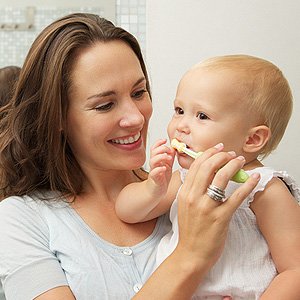You can’t go wrong with an early start caring for your child’s teeth and gums. In fact, dental care should begin in earnest when their first tooth appears.
You should begin by gently cleaning your infant’s gums and new teeth after each feeding with a clean, water-soaked washcloth or gauze pad. Once they start eating solid food, you should transition to a soft-bristled brush with just a smear of fluoridated toothpaste. Around age 2, you can increase that to a pea-sized amount and begin teach them to brush for themselves.
The next important element in your child’s dental care is beginning regular dental visits around their first birthday. There are good reasons to begin visits at this time. There primary teeth should now be erupting in earnest and you’ll want to begin prevention measures against tooth decay if needed. You’ll also want to get them used to going to the dentist early in life: if you wait a year or two later, they may not respond well to the unfamiliar surroundings of a dental office.
There are also a number of things you can do to support hygiene and dental visits. You should not allow your child to sleep with a pacifier covered or a bottle filled with anything but water. Milk, juices and other sugar-containing liquids will raise the risk of tooth decay. And speaking of sugar, limit their consumption to meal times: snacking constantly on sugar can create an environment ripe for decay.
Of course, dental disease isn’t the only hazard your child’s teeth may face. Accidents can happen and your child’s otherwise healthy teeth could be injured. So, make sure they don’t play too close to hard furniture or other features around the house they could fall on. If they should begin playing contact sports, invest in a custom mouth guard — avoiding an injury is well worth the cost.
Getting into dental care with your children as soon as possible will set the foundation for good oral health. And the example you set will stick with them as they take on their own dental care when they’re older.
If you would like more information on caring for your child’s teeth, please contact us to schedule an appointment.

